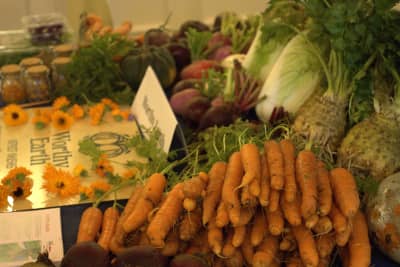Every year Good Food Oxfordshire coordinates The Oxfordshire Pumpkin Festival; a campaign to encourage more people to eat, not bin, their Halloween pumpkin. The predominant message is to reduce food waste, but why is this important?
Reducing food waste is beneficial to the environment. According to Love Food Hate Waste, in UK homes 18 million tonnes of CO2 are generated by consumable food and drink waste. Each stage in the journey of our food (from farm, to fork, to bin) draws resources from our planet and produces greenhouse gas emissions, therefore contributing to climate change.
Cutting down food waste saves us money. Replenish Oxford revealed that the average family throws away £730 of food a year. Using up food we have already bought – rather than buying more – makes us more cost efficient.
Love Food Hate Waste reported that 60% of food waste comes from UK homes. However, food waste can occur at various stages of the food supply chain, from production to distribution to consumption. Supermarkets, restaurants, households, and farms all contribute to this problem.
Although this may seem dispiriting there are numerous small steps we can take to make a difference, and collectively these small steps can enact real change.
Here are some tips to help you:
-
Plan your shopping: set a budget and write a list before you go shopping to ensure you only buy what you need and will use.
-
Food storage: storing food correctly means it will last longer. Make sure your fridge is 5 degrees or below to ensure food is kept at its freshest. Storing your fruit bowl in the fridge can also make the fruit last longer.
-
Get date label savvy: best before is about ‘food quality’ whereas use by is about ‘food safety’. Many types of food are still delicious and perfectly safe to eat past their best before date (for example loose fruit and veg). Create a ‘use first’ shelf in your fridge comprising of the food items which will go off quickly.
-
Check before you shop: check your cupboards, your fridge, and your freezer before shopping to avoid wasting money rebuying produce you already have.
-
Use your peelings and off-cuts: save time, don’t peel your carrots and potatoes, the skin contains vitamins and fibre. Use peelings and off-cuts of veg to make your own stock – boil them in water for 20 minutes then freeze the stock in ice cube trays and use when needed.
-
Meal plan for the week: this helps to plan what to buy and avoids stress in having to think what to cook each day. Leave a spare day to create a meal from leftovers – a good way to get creative and try something new!
-
Use your freezer to store food: the freezer is handy to extend shelf life; and there’s more food that can be frozen than you think!
You can freeze:
-
Cooked rice – just freeze within an hour of cooking it
-
Cooked pasta – slightly undercooked pasta is better for freezing
-
Milk – just make sure there is space in the carton for it to expand when it freezes!
-
Grated cheese
-
Yoghurt
-
Butter – freeze it in cubes so they are easy to use in cooking
-
Eggs – crack whisked eggs into a sealed container, or separate the yolks and the whites to save for cooking and baking
-
Potatoes – you can freeze mash potato in portions for easy mealtimes
-
Fruit and vegetables such as bananas, berries, tomatoes, onions, and broccoli
-
Baked goods
-
Bread
-
Herbs
Struggling to know what to do with your spare veg? Refer to the Good Food Oxfordshire cooking toolkit for some inspiration!
For more information refer to the following websites:
For more tips on the best ways to freeze your food:
Replenish have some great tips on how to reduce food waste this Christmas.
Blog written by GFO Intern Annabelle Leivers



